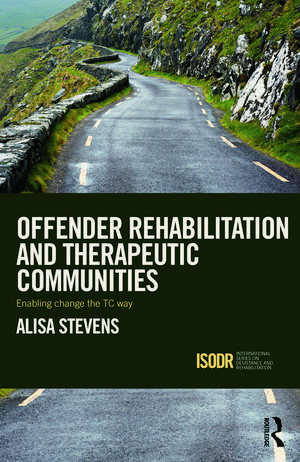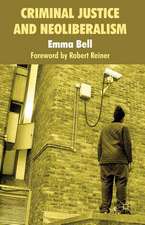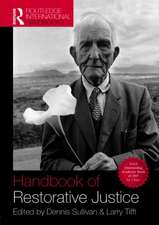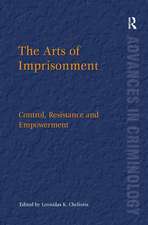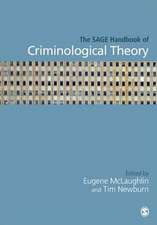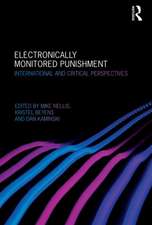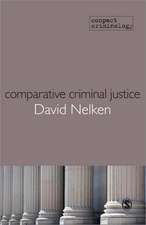Offender Rehabilitation and Therapeutic Communities: Enabling Change the TC way: International Series on Desistance and Rehabilitation
Autor Alisa Stevensen Limba Engleză Hardback – 10 oct 2012
Drawing upon original research conducted with ‘residents’ (prisoners) and staff at three TC prisons, Offender Rehabilitation and Therapeutic Communities provides a uniquely evocative and engaging portrayal of the TC regime. Individual chapters focus on residents’ adaptation to ‘the TC way’ of rehabilitation and imprisonment; the development of caring relationships between community members; residents’ contributions towards the safe and efficient running of their community; and the greater assimilation of sexual offenders within TCs for men, made possible in part by a lessening in ‘hypermasculinity’.
By analyzing residents’ own accounts of ‘desistance in process’ in the TC, this book argues that TCs help offenders to change by enabling positive developments to their personal identity and self-narratives: to the ways in which they see themselves and their life. The radically ‘different’ penal environment allows its residents to become someone ‘different’.
| Toate formatele și edițiile | Preț | Express |
|---|---|---|
| Paperback (1) | 484.69 lei 6-8 săpt. | |
| Taylor & Francis – 10 mar 2014 | 484.69 lei 6-8 săpt. | |
| Hardback (1) | 822.54 lei 6-8 săpt. | |
| Taylor & Francis – 10 oct 2012 | 822.54 lei 6-8 săpt. |
Din seria International Series on Desistance and Rehabilitation
-
 Preț: 310.84 lei
Preț: 310.84 lei - 9%
 Preț: 1005.06 lei
Preț: 1005.06 lei -
 Preț: 310.51 lei
Preț: 310.51 lei - 9%
 Preț: 1005.14 lei
Preț: 1005.14 lei -
 Preț: 308.93 lei
Preț: 308.93 lei -
 Preț: 406.97 lei
Preț: 406.97 lei -
 Preț: 385.25 lei
Preț: 385.25 lei -
 Preț: 434.83 lei
Preț: 434.83 lei - 9%
 Preț: 904.00 lei
Preț: 904.00 lei -
 Preț: 385.62 lei
Preț: 385.62 lei -
 Preț: 449.41 lei
Preț: 449.41 lei -
 Preț: 416.22 lei
Preț: 416.22 lei -
 Preț: 392.50 lei
Preț: 392.50 lei -
 Preț: 484.69 lei
Preț: 484.69 lei -
 Preț: 389.38 lei
Preț: 389.38 lei - 21%
 Preț: 257.76 lei
Preț: 257.76 lei -
 Preț: 411.64 lei
Preț: 411.64 lei -
 Preț: 233.25 lei
Preț: 233.25 lei - 5%
 Preț: 1160.70 lei
Preț: 1160.70 lei -
 Preț: 464.76 lei
Preț: 464.76 lei -
 Preț: 341.86 lei
Preț: 341.86 lei -
 Preț: 389.66 lei
Preț: 389.66 lei -
 Preț: 349.71 lei
Preț: 349.71 lei - 17%
 Preț: 258.70 lei
Preț: 258.70 lei - 18%
 Preț: 1000.87 lei
Preț: 1000.87 lei - 18%
 Preț: 1000.58 lei
Preț: 1000.58 lei - 18%
 Preț: 946.93 lei
Preț: 946.93 lei - 18%
 Preț: 1061.84 lei
Preț: 1061.84 lei -
 Preț: 388.13 lei
Preț: 388.13 lei - 5%
 Preț: 1047.47 lei
Preț: 1047.47 lei -
 Preț: 430.80 lei
Preț: 430.80 lei
Preț: 822.54 lei
Preț vechi: 1104.35 lei
-26% Nou
Puncte Express: 1234
Preț estimativ în valută:
157.41€ • 163.73$ • 129.95£
157.41€ • 163.73$ • 129.95£
Carte tipărită la comandă
Livrare economică 12-26 aprilie
Preluare comenzi: 021 569.72.76
Specificații
ISBN-13: 9780415670180
ISBN-10: 0415670187
Pagini: 240
Dimensiuni: 156 x 234 x 18 mm
Greutate: 0.6 kg
Ediția:1
Editura: Taylor & Francis
Colecția Routledge
Seria International Series on Desistance and Rehabilitation
Locul publicării:Oxford, United Kingdom
ISBN-10: 0415670187
Pagini: 240
Dimensiuni: 156 x 234 x 18 mm
Greutate: 0.6 kg
Ediția:1
Editura: Taylor & Francis
Colecția Routledge
Seria International Series on Desistance and Rehabilitation
Locul publicării:Oxford, United Kingdom
Public țintă
Postgraduate and UndergraduateCuprins
1. Therapeutic communities and prisons, 2. Conducting research in prisons: tightrope walks and emotion work, 3. New beginnings: commencing change the TC way, 4. Care, trust and support, 5. Responsibility, accountability and safety, 6. Vulnerability, unmasking and 'de-othering', 7. Pursuing change the TC way and beyond
Recenzii
"By focusing, in depth, on the experiences of residents in therapeutic communities, Alisa Stevens has crafted an intimate account of how men come to terms with traumatic experiences and their own serious offending. The pain, turmoil, optimism and hope are captured as the men journey towards a different future. These stories reveal the potential of therapeutic communities to provide a model for an effective and humane approach to imprisonment."
Jamie Bennett, Governor of HMP Grendon and Springhill, UK.
"In Offender Rehabilitation and Therapeutic Communities, Alisa Stevens provides a thorough and highly original account of the culture and dynamics of prison-based therapeutic communities. Written vividly and elegantly throughout, the book provides a vital bridge between studies of the daily life of the prison and the growing literature on identity change and desistance. It is an extremely valuable and welcome addition to both fields."
Dr. Ben Crewe, Deputy Director of Prisons Research Centre, University of Cambridge, UK.
"This scholarly, insightful and often-compelling study of therapeutic communities (TCs) makes a significant contribution to the ongoing resurgence in ethnographic studies of the modern prison."
Joe Sim, Liverpool John Moores University
'This scholarly, insightful and often-compelling study of therapeutic communities (TCs) makes a significant contribution to the ongoing resurgence in ethnographic studies of the modern prison …Each chapter is built on the qualitative data Alisa Stevens generated during her fieldwork which she discusses in an excellent, seventh chapter on conducting research in prisons. Deploying these data throughout the text adds an eloquence, depth and poignancy to the central core of the book’s focus, namely the processes involved in individual change and the drive of those in the TCs to reach a different, positive psychological space that will lead to them desisting from crime …The book offers a powerful challenge to the reductive positivism so intrinsic to state and media constructions of the risk-laden, unchangeable, abnormal other. It also challenges the pessimistic self-serving mindset of policy makers and politicians who endlessly pontificate about academic work contributing little that is positive to the policy process or rather to their already-defined policy process. For these reasons, it deserves to be widely read as it points towards a different path that inevitably leads to alternative, more empowering, outcomes for the confined while lessening the chances of further victimization.' – Joe Sim, British Journal of Criminology, September 2014
'This is a beautifully written, detailed and sensitive ethnography of an unfashionable corner of the prison estate in England and Wales. Moreover, it is an approach that has survived many critical onslaughts and that in itself suggests that there is something worth preserving and celebrating here. Stevens’ research will undoubtedly contribute to that process, reminding the older generation of criminologists and criminal justice practitioners of why we were inspired by TCs and bringing that inspiration to a new generation of students and practitioners.' – Anne Worrall, Criminal Law and Criminal Justice Books, May 2013.
'Alisa Stevens has written a captivating research monograph, in which she vividly describes the culture of therapeutic communities and how residents work towards a crime-free future ... Stevens has made a unique contribution to the desistance literature by analysing desistance as it is taking place rather than retrospectively trying to understand why ex-offenders ceased to commit crimes ... [Offender Rehabilitation and Therapeutic Communities] is a pleasure to read. The book will be informative for prison and desistance researchers and anyone with a stake in imprisonment policy ... [and] gives the reader an excellent insight into the penal counter-culture of TCs, where the rehabilitative ethos trumps punishment.' – Esther van Ginneken, Cambridge University, Criminology and Criminal Justice 2013 13: 474.
'Alisa Stevens’ book provides a welcome and thought provoking contribution to the role which therapeutic communities have in offender rehabilitation. Based on observations and in-depth interviews the author conducted across a number of prison based democratic therapeutic communities, Stevens provides an analysis, not only of relevance to therapeutic communities, but which also contributes to a wider understanding of rehabilitation and offender desistance.' – Richard Shuker, HMP Grendon, Prison Service Journal 2013 208: 56-58.
Jamie Bennett, Governor of HMP Grendon and Springhill, UK.
"In Offender Rehabilitation and Therapeutic Communities, Alisa Stevens provides a thorough and highly original account of the culture and dynamics of prison-based therapeutic communities. Written vividly and elegantly throughout, the book provides a vital bridge between studies of the daily life of the prison and the growing literature on identity change and desistance. It is an extremely valuable and welcome addition to both fields."
Dr. Ben Crewe, Deputy Director of Prisons Research Centre, University of Cambridge, UK.
"This scholarly, insightful and often-compelling study of therapeutic communities (TCs) makes a significant contribution to the ongoing resurgence in ethnographic studies of the modern prison."
Joe Sim, Liverpool John Moores University
'This scholarly, insightful and often-compelling study of therapeutic communities (TCs) makes a significant contribution to the ongoing resurgence in ethnographic studies of the modern prison …Each chapter is built on the qualitative data Alisa Stevens generated during her fieldwork which she discusses in an excellent, seventh chapter on conducting research in prisons. Deploying these data throughout the text adds an eloquence, depth and poignancy to the central core of the book’s focus, namely the processes involved in individual change and the drive of those in the TCs to reach a different, positive psychological space that will lead to them desisting from crime …The book offers a powerful challenge to the reductive positivism so intrinsic to state and media constructions of the risk-laden, unchangeable, abnormal other. It also challenges the pessimistic self-serving mindset of policy makers and politicians who endlessly pontificate about academic work contributing little that is positive to the policy process or rather to their already-defined policy process. For these reasons, it deserves to be widely read as it points towards a different path that inevitably leads to alternative, more empowering, outcomes for the confined while lessening the chances of further victimization.' – Joe Sim, British Journal of Criminology, September 2014
'This is a beautifully written, detailed and sensitive ethnography of an unfashionable corner of the prison estate in England and Wales. Moreover, it is an approach that has survived many critical onslaughts and that in itself suggests that there is something worth preserving and celebrating here. Stevens’ research will undoubtedly contribute to that process, reminding the older generation of criminologists and criminal justice practitioners of why we were inspired by TCs and bringing that inspiration to a new generation of students and practitioners.' – Anne Worrall, Criminal Law and Criminal Justice Books, May 2013.
'Alisa Stevens has written a captivating research monograph, in which she vividly describes the culture of therapeutic communities and how residents work towards a crime-free future ... Stevens has made a unique contribution to the desistance literature by analysing desistance as it is taking place rather than retrospectively trying to understand why ex-offenders ceased to commit crimes ... [Offender Rehabilitation and Therapeutic Communities] is a pleasure to read. The book will be informative for prison and desistance researchers and anyone with a stake in imprisonment policy ... [and] gives the reader an excellent insight into the penal counter-culture of TCs, where the rehabilitative ethos trumps punishment.' – Esther van Ginneken, Cambridge University, Criminology and Criminal Justice 2013 13: 474.
'Alisa Stevens’ book provides a welcome and thought provoking contribution to the role which therapeutic communities have in offender rehabilitation. Based on observations and in-depth interviews the author conducted across a number of prison based democratic therapeutic communities, Stevens provides an analysis, not only of relevance to therapeutic communities, but which also contributes to a wider understanding of rehabilitation and offender desistance.' – Richard Shuker, HMP Grendon, Prison Service Journal 2013 208: 56-58.
Descriere
Drawing upon original qualitative research with prisoners in three democratic therapeutic communities (TCs), this book provides a unique sociological portrayal and new criminological understanding of the TC’s rehabilitative regime and culture.
